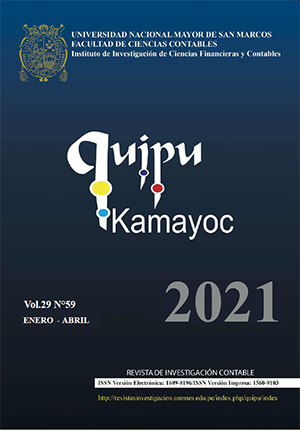Precisiones en pasivos, provisiones y pasivos contingentes a partir de la teoría de probabilidades
DOI:
https://doi.org/10.15381/quipu.v29i59.20143Palabras clave:
Pasivo, provisión, pasivo contingente, evento, incertidumbreResumen
Objetivo: Describir los conceptos de pasivos, provisiones y pasivos contingentes a partir de aspectos relevantes de la Teoría de Probabilidades. Método: La investigación fue cualitativa, descriptiva, no experimental con el uso del método deductivo-inductivo, sobre la base del análisis de contenido de las Normas Internacionales de Información Financiera (NIIF) y la Teoría de Probabilidades. Resultados: Los resultados muestran discrepancias sobre los conceptos de pasivos, provisiones y pasivos contingentes, entre lo planteado por la NIC 37 y el Marco Conceptual para la Información Financiera, considerando además aspectos relevantes de la Teoría de Probabilidades. Conclusión: Existen divergencias conceptuales entre la NIC 37 y el Marco Conceptual para la Información Financiera respecto a la definición de pasivos, provisiones o pasivos contingentes, lo cual podría producir un impacto relevante en los estados financieros, así como su inadecuada interpretación.
Descargas
Publicado
Número
Sección
Licencia
Derechos de autor 2021 Rosa Milagros Castañeda Moreano

Esta obra está bajo una licencia internacional Creative Commons Atribución 4.0.
LOS AUTORES RETIENEN SUS DERECHOS:
a. Los autores retienen sus derechos de marca y patente, y también sobre cualquier proceso o procedimiento descrito en el artículo.
b. Los autores retienen el derecho de compartir, copiar, distribuir, ejecutar y comunicar públicamente el articulo publicado en la revista Quipukamayoc (por ejemplo, colocarlo en un repositorio institucional o publicarlo en un libro), con un reconocimiento de su publicación inicial en la revista Quipukamayoc.
c. Los autores retienen el derecho a hacer una posterior publicación de su trabajo, de utilizar el artículo o cualquier parte de aquel (por ejemplo: una compilación de sus trabajos, notas para conferencias, tesis, o para un libro), siempre que indiquen la fuente de publicación (autores del trabajo, revista, volumen, numero y fecha).






